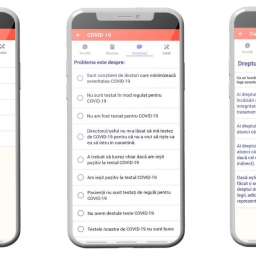Scrisoare deschisă
The governing coalition must stand up for integrity, not corruption
To Mr. Marcel Ciolacu, President of the Chamber of Deputies,
To Mr. Alfred-Robert Simonis, the leader of the PSD parliamentary group in the Chamber of Deputies,
To Mr. Gabriel Andronache, the leader of the PNL parliamentary group in the Chamber of Deputies,
To Mr. Csoma Botond, the leader of the UDMR parliamentary group in the Chamber of Deputies,
To Mr. Varujan Pambuccian, Leader of the Minorities parliamentary group in the Chamber of Deputies,
To Mrs. Laura-Cătălina Vicol-Ciorbă, president, Legal, Discipline and Immunities Committee, Chamber of Deputies,
The Romanian Senate failed to fix the dysfunctions in the whistleblower legislation, despite the Romanian President's request for re-examination. In the first plenary session of the new parliamentary session, after the meetings of the parliamentary committees, held quickly before, regarding the request for re-examination, one of the fundamental problems - the possibility of anonymous reporting - remains unresolved.
The signatory organizations appeal to the governing coalition and the Legal Committee of the Chamber of Deputies to analyze and approve the Law on the Protection of Whistleblowers in the Public Interest (PL-x nr. 219/2022, L nr. 175/2022) with the involvement of civil society and other stakeholders.
As we showed in our public appeals from July to President Klaus Iohannis, the proposal to amend the law, in the form that was sent for reconsideration, diminishes the protection mechanisms that whistleblowers enjoy under the legislation still in force, which has been stated publicly and in parliamentary debates, repeatedly, by experts and representatives of civil society, including whistleblowers.
The legislative proposal, in the form in which it was sent for re-examination, contains a series of provisions that contradict the spirit in which the Directive was written that it proposes to transpose. Thus, if the text of the Directive talks about enhanced protection, establishing safe reporting channels and consider protection mechanisms for a range of retaliation that whistleblowers may be subject to, the changes made in June in the Romanian Parliament have diminished obviously and significantly the sphere of protection that a whistleblower must enjoy in a democratic state.
We repeat a series of arguments presented previously in the public space, with the aim of emphasizing the seriousness of the situation we are talking about, an approach also supported by integrity whistleblowers:
Main arguments for drafting a bill that would ensure real protection for people who report violations of the law
- Beyond the possible blockages and sanctions at the European level, which come with the non-transposition of the provisions in the agreed time Directive (EU) 2019/1937 of the European Parliament and the Council of October 23, 2019 regarding the protection of persons who report violations of Union law, including repercussions related to the National Recovery and Resilience Plan, the main and eponymous character, namely the whistleblower, must be at the center of any discussion.
- Moreover, we recall that, in the Rule of Law Report, published a month ago, the European Commission also mentions the insufficient protection of whistleblowers. With regard to the initiation of the procedure for ascertaining the non-fulfilment of obligations (also known as the infringement procedure), we emphasize that proposing a law with inappropriate content in the light of European requirements will not solve this situation, as it emerges from a communique of the European Public Prosecutor's Office, issued at the end of June 2022.
- Most importantly, the future law must not violate a basic principle of EU law, namely that Member States can go beyond EU legislative provisions, not least in the sense of introducing more lax legislation, in this case Article 25 (2) of the Directive, which forbids that, by its transposition into the domestic law of a member state, the decrease of the level of protection granted to a whistleblower by a national law that already exists in that Member State.
- It further prohibits the whistleblower, even in the version of the law that was passed by the Senate today, from making public disclosures about violations of the law regarding acquisitions in areas considered by the state to be essential for national security, without specifying how concrete, explicit, clear and predictable, which disclosures of rule violations do not fall under the scope of the whistleblower law.
- The whistleblower must be able to address the media freely, directly, and not only after three months of reporting or only if, beforehand, they report internally.
- Anonymous reporting, in the form adopted today by the Senate, does not represent a correct implementation of the principles of this important type of notification of violations of the law, given that the validity of this reporting is conditioned by the provision of the contact details of the whistleblower in the public interest and the quality of the person who carries out the reporting, an obvious attempt by the parties in the governing coalition to discourage these warnings in the public interest. Moreover, this wording in the law also affects the private environment, since anonymous reporting was an effective practice in the private sector as well.
- The principle of good faith of the whistleblower in the public interest must be maintained in the law that will be adopted.
- Integrity warnings must not be destroyed after two years, but after 5 years, in order to keep a necessary and proportionate time frame, as the Directive provides.
- Very small administrative-territorial units, under 10,000 inhabitants, must be able to associate in order to apply the law, as recommended by the Directive.
- Overall, through the law adopted in June by the Romanian Parliament, vague, interpretable or even contradictory wording was introduced, with the aim of reducing the level of protection of whistleblowers, who will be discouraged from the start to report violations of the law, knowing that the majority to those who reported until then they were persecuted in the institutions they belong to.
By virtue of these arguments, we launch a call to you and your colleagues: judiciously use the opportunity to reexamine the provisions that change not only the content, but also the spirit of the law and fundamentally affect the role of the whistleblower!
You have the opportunity to rectify a situation that is more than worrying and to ensure not only the lack of consequences deriving from the non-transposition of the Directive (namely the start of the procedure for ascertaining non-fulfillment of obligations) or the smooth running of the National Recovery and Resilience Plan, but also to assume that you understand the fundamental role of the integrity whistleblower and that you support, through your work in Parliament, the essential fight that whistleblowers undertake out of altruism and ultimately for the proper functioning of the state.
Given the accelerated legislative timetable, we are also showing the desire to participate in the work of the commissions and to have applied discussions on provisions that reflect good whistleblower protection.
With consideration,
ActiveWatch
Apador-CH
Centrul pentru Inovare Publică
CeRe: Centrul de Resurse pentru participare publică
Asociația CIVICA
Asociația pentru Cooperare și Dezvoltare Durabilă
Dăruiește Viață
Declic
European Ethics & Compliance Association
Evoluție în Instituție
Expert Forum
FDSC – Fundația pentru Dezvoltarea Societății Civile
Forum Apulum
Freedom House, România
Fundaţia pentru Drepturile Omului-CELEST
Funky Citizens
Geeks for Democracy
Federația Sindicală Hermes
Inițiativa România
Asociația Miliția Spirituală
Asociația Parcul Natural Văcărești
Alianţa Naţională a Sindicatelor Feroviare
Asociaţia Naţională a Patronatelor Operatorilor în Regim de Taxi
Asociaţia Pentru Drepturile Omului Imaginea României
Asociația Pro Democrația
Asociaţia Profesională a Transportatorilor (APT)
Reset
Rezistența
Asociația Repiro
Asociația Rise OUT
ApTI – Asociația pentru Tehnologie și Internet ApTI
Sindicatul Transpublic din STB
Sindicatul Național al Polițiștilor din România DECUS
Sindicatul Polițiștilor Europeni EUROPOL
Uniunea Romilor din Europa
VeDem Just
Mihaela Cuțui, avertizor de integritate public, purtător de cuvânt, vicepreședinte Colegiul Medicilor Stomatologi Timiș






Susțin!
Într-o țară în care etica tinde să dispară până și din vocabular, avertizorii de integritate sunt exemplare rare dintr’o specie pe cale de dispariție. România are nevoie de ei, ca de aer!